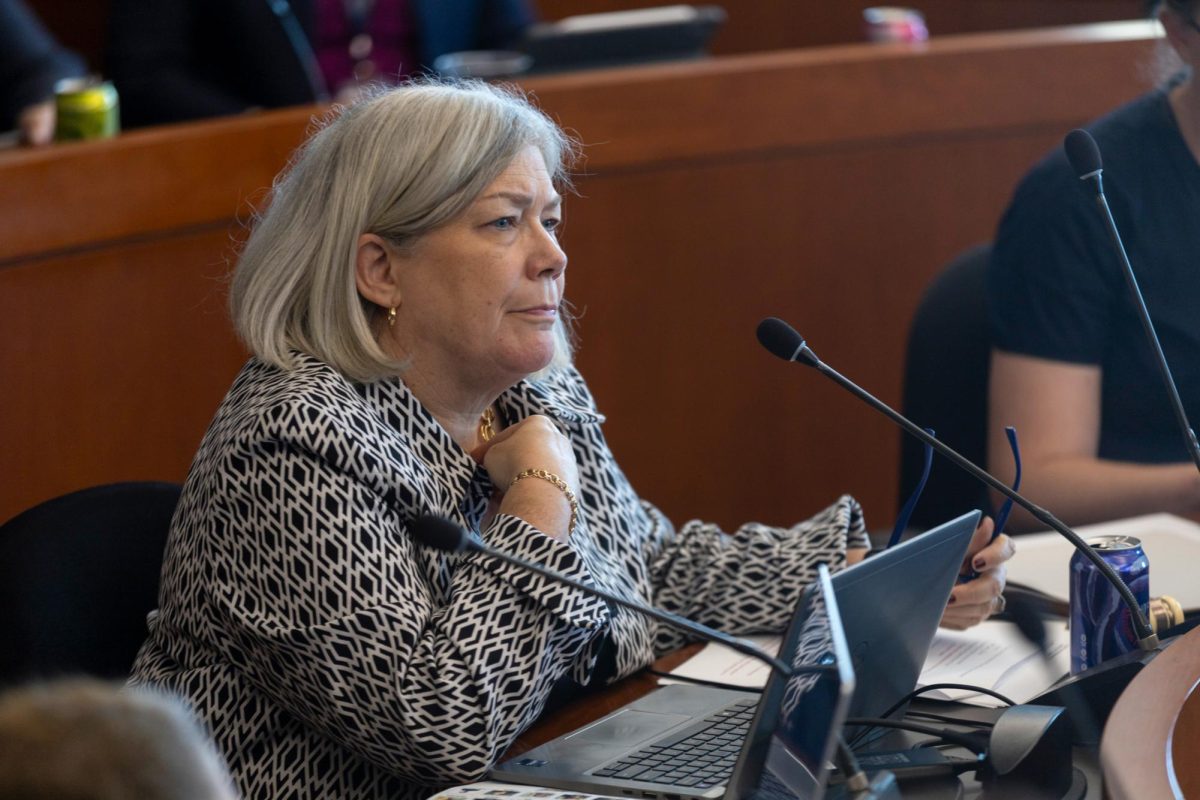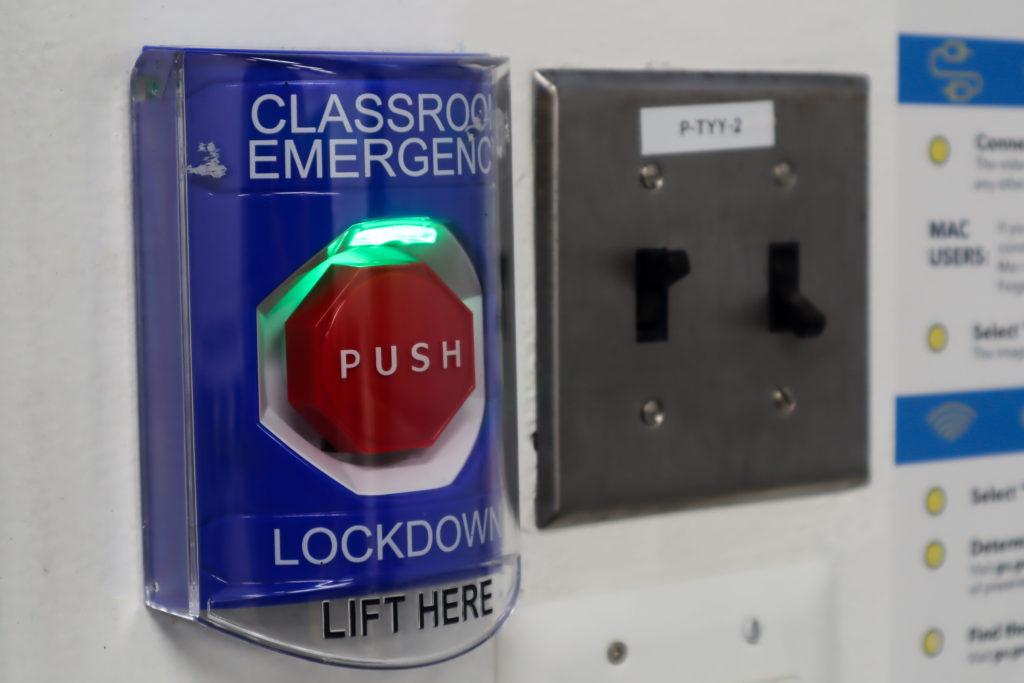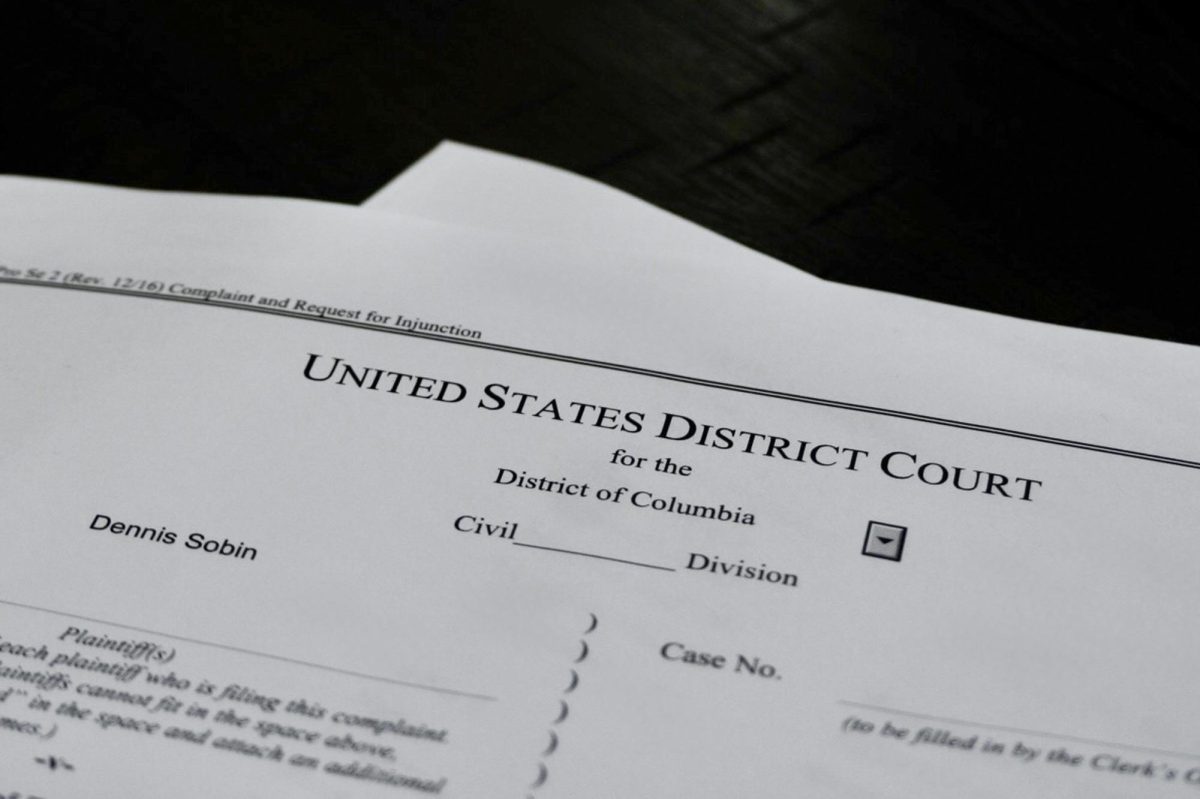University President Ellen Granberg detailed officials’ progress developing GW’s next strategic plan at an Alumni and Families Weekend event in the University Student Center Saturday, pausing her speech four times while security guards escorted pro-Palestinian protesters out of the auditorium.
Granberg outlined the four main components GW will incorporate into the strategic framework — which officials will then use to create the strategic plan — during her “Presidential Dialogue,” one of the University’s Alumni and Families Weekend events. Four pro-palestinian protesters, two of whom identified themselves as alumni, stood up at different points during her speech and condemned the University’s refusal to divest from Israel before security guards escorted them out of the building.
Granberg said the University’s strategic framework — which details officials’ intent to advance interdisciplinary research, bolster students’ global perspectives, teach skills for global excellence and prioritize professional and skill development — will also expand support resources for faculty research and students. She encouraged alumni to reflect on their time at the University as officials develop a plan for the future.
“Every event, I think, is a reminder that the GW experience transcends generations,” Granberg said. “There are intimate gatherings and there are grand celebrations where we get to feel that, where we get to honor our history and traditions, and where we get to celebrate today’s strengths.”
Five minutes into her speech, the first protester, who said they were a GW alum, stood up in the audience and said Granberg has blood on her hands, referring to the blood of Palestinians who have died in the war in Gaza.
“Ellen Granberg, as a GW alum, I am ashamed of your administration’s oppression and targeting of students who are peacefully demanding this university divest from genocide,” the alumni said. “Shame on you Ellen Granberg.”
A security guard escorted the protester out of the room and Granberg continued her speech, noting that she has had many opportunities to meet with “incredible” community members over the last year. She then addressed the disruption, saying that the University and its community members have faced challenges over the last year because many people are engaged in and passionate about world events, or have been affected by them personally.
“As you know, and as we just saw, the last year has also presented its fair share of turbulence and challenges,” Granberg said.
As Granberg began to note that the University has faced challenging situations related to free speech, another protester rose from their seat and yelled “what is our role?”
“Shame on this university,” the protester said. “I am ashamed of the alumni of this University who won’t divest. Our students are making the calls, and Ellen Granberg is not listening.”
As security escorted the protester out of the auditorium, Granberg began discussing the University’s commitment to fostering leadership and helping students tackle complex global challenges.
“Today, of course, the world is developing global leaders who will face increasingly complex and existential challenges, and we owe it to our students and the world to equip them with the skills and courage required to engage with the most complex and difficult issues,” Granberg said.
Granberg highlighted recent University accomplishments like official’s launch of the new center for interfaith and spiritual life, the Division of Student Affairs efforts to train students on how to engage with challenging ideas. Granberg said free expression is “essential” to the growth of the community, but not at the cost of safety or academic success.
“Our scholars have to be able to engage in robust dialogue and in rigorous debate, but it cannot be at the expense of safety or the risk of disruption to our academic mission,” Granberg said.
Granberg said officials are working to clarify how students should balance free expression with safety and the University’s academic mission. She said the University will be distributing a collection of resources to community members intended to clarify campus policies on expressive activity.
“We are a place that welcomes debate, action and protest, and we want our students to learn how to use their voices to have a real impact, while we balance that we maintain a safe and productive environment,” Granberg said.
As she spoke about the GDub Election Hub, a University site for political engagement, another protester who identified themselves as an alum rose in the audience.
“You invest in genocide. Shame on this University. As an alum, I am not proud to have attended George Washington University,” the alumni said.
Granberg did not address the protester and continued her speech, presenting the University’s new strategic framework, which she said is focused on building global leaders, enhancing student achievement and fostering interdisciplinary research. As she detailed officials’ intent to expand resources for students other community members, a third protester rose.
“GW funds genocide,” the protester said.
As a security guard escorted the third protester out, one audience member clapped in support of the protester. This individual was quietly asked to leave by security as well.
Granberg said after hearing many ideas for what the future of GW should look like, the University has formed a committee of faculty and staff that will “flesh out” the University’s plans for the future.
“We’ve now put together a faculty committee — faculty and staff —that are going to be working out, ‘How do we flesh out these ideas?'” she said. “And then a senior steering committee that will take their feedback and pull together a full strategic framework, along with timelines and budgets and those sorts of things, and then present to our Board of Trustees next May a proposed plan.”
She concluded her presentation by encouraging alumni to actively engage in shaping the future of GW by attending more events, like virtual town halls, and sharing their opinions throughout the framework’s development.
Granberg closed her remarks with a video that emphasized the University’s close proximity to the nation’s capital, showcasing the GW community—faculty, staff, and students—and its mission to create opportunities that enable the University to make a meaningful impact on society.
As the video concluded a final protester rose from their seat and security guards escorted them out of the auditorium.
Granberg did not address this protester and then opened the floor for questions. In the first question, and audience member addressed the protests and continued interruption.
“As we’ve seen multiple people walk out of the room, I’d like to know your answer: What is GW doing to divest from genocide?” the audience member asked.
“All universities have an endowment, and our primary goal for our endowment is to be able to generate funds that support our students,” Granberg said. “Endowments pay for scholarships, they help to defray increases in the cost of tuition. So, our primary aim is to focus on that.”
Another audience member asked about Granberg’s reaction to anti-Semitic experiences on campus. Granberg has previously denounced antisemitic actions on campus and said there is no place for bigotry at GW.
“Higher ed has a special responsibility to combat thinking that places one group of people above others or below others,” Granberg said. “So that’s been a big focus for us this entire year, and it is embedded into some of the leadership and skill development work I was talking about. But I’ll tell you where it’s especially embedded: it’s the student-to-student conversation.”




